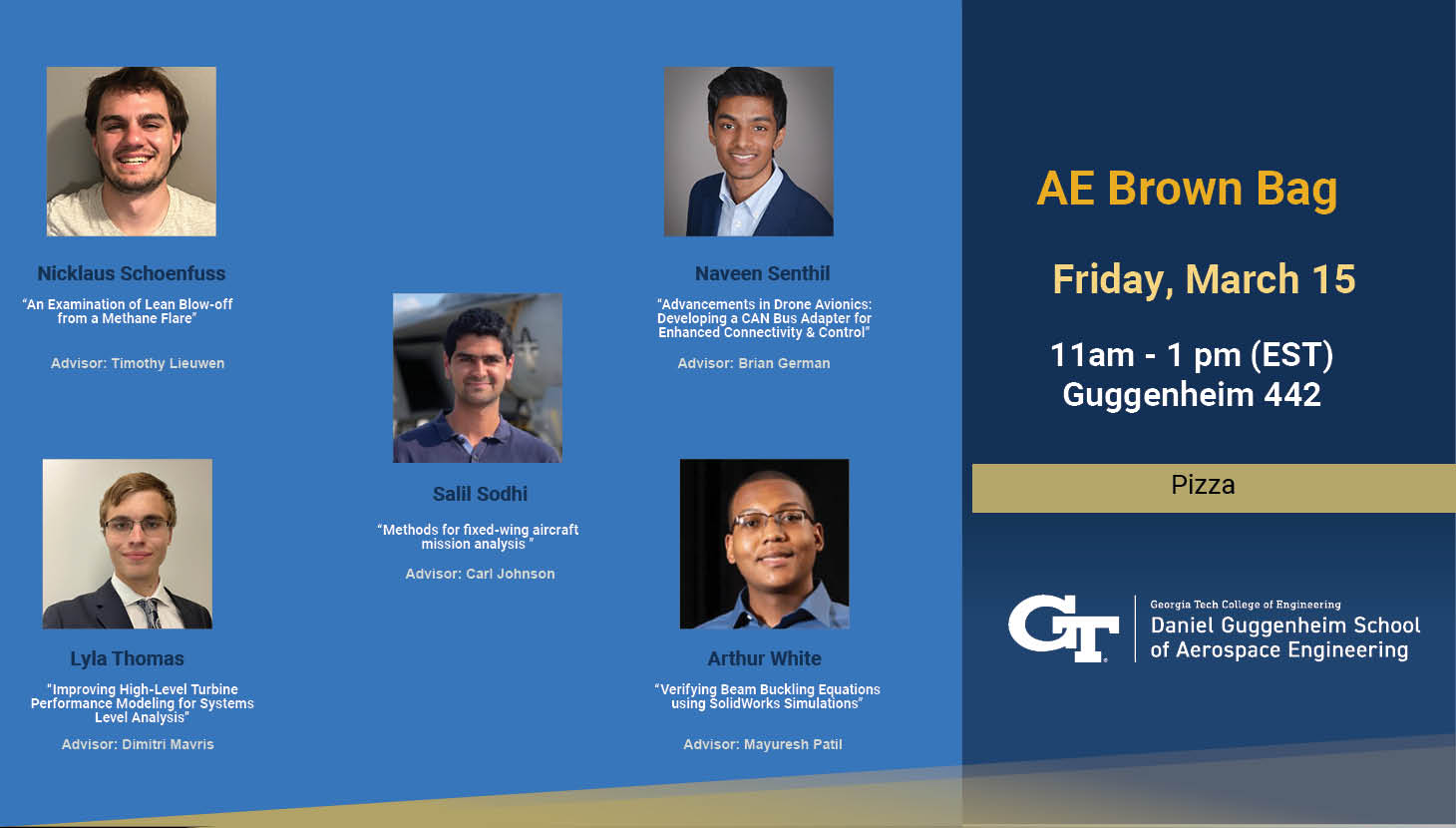
AE Brown Bag Seminar
Friday, March 15
11:00 a.m. -1:00 p.m.
Guggenheim 442
Pizza Served
Nicklaus Schoenfuss
Naveen Senthil
Akash Shiri
Salil Sodhi
Lyla Thomas
Arthur White
Nicklaus Schoenfuss
Title:
An Examination of Lean Blow-off from a Methane Flare
Abstract:
Many byproducts of industrial processes are harmful to the environment and contribute to climate change. Oftentimes, it is better to burn these products rather than releasing them into the atmosphere. Flares are the tools that usually carry out this process. Leab blow out is a process where the mixture of fuel and oxidizer becomes too low to continue to sustain a flame and thus the flame is extinguished. This process is undesirable in a flare for obvious reasons and the project in question uses a methane flare in accordance with an air compressor to determine the regions of lean blowout. Acoustic and laser diagnostic data collected by the project will be used by Spectral Energies LLC to develop a machine learning algorithm that can be used to detect lean blowoff for an industrial flare.
Faculty Advisor:
Professor Timothy Liuewen
Naveen Senthil
Title:
Advancements in Drone Avionics: Developing a CAN Bus Adapter for Enhanced Connectivity and Control
Abstract:
The integration of Controller Area Network (CAN) bus technology into drone avionics systems presents a promising avenue for enhanced connectivity and scalability. While widely used in automotive and industrial applications, CAN is not yet a prevalent protocol in drone avionics due to the dominance of simpler protocols like UART and SPI. However, these protocols pose limitations in scalability and complexity as the number of peripheral devices increases, leading to challenges in wiring and space management.
This research addresses this challenge by developing a CAN bus adapter that seamlessly integrates CAN bus technology into existing drone avionics topologies. The adapter serves as a node between the CAN bus and peripheral devices, facilitating the use of CAN protocol without necessitating hardware modifications. By leveraging the bus topology of CAN, the adapter enables greater scalability while maintaining high transmission speeds, thus overcoming some limitations of point-to-point architectures.
This presentation will detail the design, implementation, and benefits of the CAN bus adapter, highlighting its potential to revolutionize drone avionics systems by offering a flexible and scalable connectivity solution for a wide range of peripheral devices.
Faculty Advisor:
Professor Brian German
Akash Shiri
Title:
Slosh-Damping Correlation Verification with a L1 Rocket Experiment
Abstract:
Propellent sloshing is a growing field that involves the analysis of the oscillatory motion of liquid fuel when a force is exerted upon it. The influence this motion has on spacecraft dynamics is an important factor in the design of any vehicle due to the large percentage of fuel in spacecraft. Current mechanical models and sloshing formulae will be tested with an experimental sloshing setup in an L1 rocket. This presentation will discuss the theory and the design process behind such a rocket.
Faculty Advisor:
Professor Alvaro Romero-Calvo
Salil Sodhi
Title:
Methods for fixed-wing aircraft mission analysis
Abstract:
This seminar will discuss trajectory analysis methods and how they have been applied to Design Build Fly aircraft. It will show equations of motion formulations, and validation of the trajectories through flight testing. It will show how trajectory analysis can be combined with mission objectives to conduct mission analysis. Finally it will talk about using Dymos, a more sophisticated trajectory analysis tool, with codes like NASA's Aviary and ASDL's internal mission analysis code.
Faculty Advisor:
Professor Carl Johnson
Lyla Thomas
Title:
Improving High-Level Turbine Performance Modeling for Systems Level Analysis
Abstract:
For aircraft design and analysis it is important to have robust, yet computationally inexpensive ways to determine engine performance. A common approach in systems level modeling is using scaled turbine maps to determine efficiency. While computationally inexpensive, this approach lacks granularity, making it difficult to estimate the impact of various turbine technology improvements. Much research has been done on estimating losses due to various mechanisms, such as tip clearance leakage, radial flows, and profile losses. Developing and implementing a more developed turbine loss model also helps interfacing with external partners, allowing models to be better tuned to account for specific improvements.
Tip clearance and leakage losses are a significant source of turbine losses, and much research is being done on how to improve performance. The method outlined in Lakshminarayana’s Methods of Predicting Tip Clearance Effects in Axial Flow Turbines was selected to model these losses, as it was the preferred model of our partners. The findings from this model will be compared to the turbine loss model outlined by the AMDCKO model, a commonly used loss model.
Faculty Advisor:
Professor Dimitri Mavris
Arthur White
Title:
Verifying Beam Buckling Equations using SolidWorks Simulations
Abstract:
The seminar will focus on the comparison of critical load values calculated for the first mode of beam buckling in various conditions by beam buckling equations and by the finite element analysis (FEA) done in SolidWorks Simulation. The simulation is done through the SolidWorks buckling study feature which allows for complete control over material selection, boundary conditions, as well as the applied loads. Through these buckling studies, the critical load is displayed and can be compared to that of which was calculated through the standard first mode beam buckling equations. The use of computational software for high-fidelity structural analysis can be time and resource expensive, so this seminar will explain the accuracy of the equations to justify their use in early buckling analysis.
Faculty Advisor:
Professor Mayuresh Patil